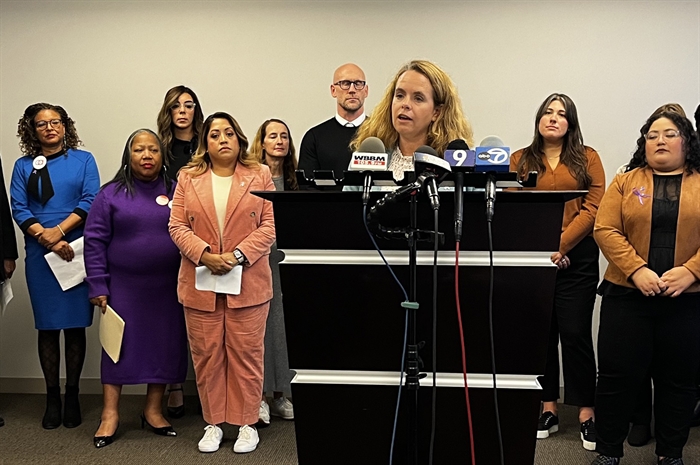Advocates push for guns to be taken from domestic abusers when order of protection served

CHICAGO – As lawmakers prepare to return to Springfield later this month for their annual two-week fall veto session, advocates are pushing for a measure that would require law enforcement to take guns away from people hit with domestic violence orders of protection.
In May, Democrats in the Illinois House passed a bill including that provision, but the Senate didn’t take up the proposal before the end of the General Assembly’s spring session. A little over a month later in early July, Chicago resident Karina Gonzalez, her 15-year-old daughter Daniela and 18-year-old son Manny were allegedly shot by Gonzalez’ husband Jose Alvarez after she was granted an order of protection against him.
Karina and Daniela died from their wounds, while Manny escaped and survived. On Thursday, he sat stoically as lawmakers and advocates explained the urgency of passing a clarification to current law at a downtown Chicago news conference.
“Their murder is horrific and should have never happened,” said State Sen. Celina Villanueva, D-Chicago, noting the shooting happened just a few blocks from her district office in Little Village on the city’s southwest side. “Manny, I’m sorry.”
Under existing law, when petitioning a court for a domestic violence order of protection, a victim can ask for 18 specific “remedies,” including the revocation of the alleged abuser’s Firearm Owner Identification (FOID) card. But state law is less than clear on how a FOID card should be surrendered – or forcibly taken by law enforcement if need be.
Once a FOID card is revoked due to an order of protection, any firearms a person owns are supposed to be transferred to someone else with a valid FOID card for the duration of the protective order. But Amanda Pyron, executive director of Chicago-based domestic violence advocacy organization The Network, said sometimes guns are transferred to someone who lives with the abuser, meaning the guns are never “actually relinquish(ed).”
Additionally, Pyron said the firearm remedy is being applied inconsistently across Illinois. A 2022 report from The Network found that in 2021, nearly 11,000 Illinoisans had their FOID cards revoked, but only 4,000 actually filed paperwork with the Illinois State Police showing firearms had been transferred to another FOID card holder. The report stipulates that not all of the 11,000 revocations were due orders of protection but noted that domestic violence is the number one reason for FOID cards being revoked in Illinois.
State Rep. Maura Hirschauer, D-Batavia, who sponsored the measure this spring, said it’s critical that the law is clarified so law enforcement is given a clear directive that firearms must be confiscated within 48 hours of a victim being granted a domestic violence order of protection against their abuser. It would also explicitly allow a judge to issue a search warrant for those weapons when law enforcement goes to serve the order of protection.
Hirschauer said Illinois’ current order of protection process is “failing too many domestic violence survivors.”
“An order of protection is a key tool to help survivors, especially as they try to leave a violent relationship,” Hirschauer said Thursday. “When an order of protection is granted with the firearm remedy, that gun needs to be removed from the home immediately. We cannot have any ambiguity about this process. The stakes are too high.”
Advocates on Thursday cited a 2003 study that found that in domestic violence cases, an abuser’s access to a firearm was associated with a five-fold increased risk of homicide.
According to reporting by the Chicago Sun-Times, Gonzalez was granted a domestic violence order of protection against Alvarez in June. The next day, Chicago Police were called to their home on a domestic disturbance call but didn’t search for his name in the statewide law enforcement database where orders of protection are registered. Alvarez willingly gave police his FOID card, but closed the window he was speaking to officers through when they officers tried to give it back.
When Cook County sheriff’s deputies went to officially serve Alvarez his order of protection the day after police visited the house, he wasn’t home, according to Sun-Times reporting. Law enforcement never verified that he gave up his gun, and Gonzalez and her children moved back in with Alvarez a few days later after he promised to go to rehab.
Roughly a week later, Alvarez allegedly shot the three of them. He was charged with two counts of first-degree murder, along with one count of attempted murder and a single count of aggravated discharge of a firearm. His next court date is in November.
In May, Hirschauer shepherded her broader bill through the House, which also would have created a task force to study the feasibility of requiring gun owners to carry liability insurance and included a provision to expand a probation program for first-time offenders charged with illegal gun possession. The probation program was stripped out and passed with bipartisan support in the last hours of lawmakers’ spring session.
Read more: As assault weapons ban faces challenges, lawmakers consider more gun restrictions
But after Gonzalez’ murder this summer and in the midst of National Gun Violence Awareness Month in October, Hirschauer and advocates say lawmakers should prioritize passing the order of protection portion of her stalled bill.
However, she and Villanueva acknowledged there were still technical hurdles to work through before offering a final version of the proposal in veto session. They include questions like how the Illinois State Police – the entity that oversees FOID cards – interacts with local law enforcement, and how local police are supposed to handle the storage of firearms they confiscate from someone with a domestic violence order of protection.
During debate on the bill in the House this spring, Republicans like State Rep. Patrick Windhorst, R-Metropolis, himself a former state’s attorney, called the proposal an unfunded “additional burden” on law enforcement. State Rep. C.D. Davidsmeyer, R-Jacksonville, claimed the bill would create “an opportunity for people who don’t want someone to have a gun to go after them.”
Veto session begins Tuesday, Oct. 24.
Miss Clipping Out Stories to Save for Later?
Click the Purchase Story button below to order a print of this story. We will print it for you on matte photo paper to keep forever.

